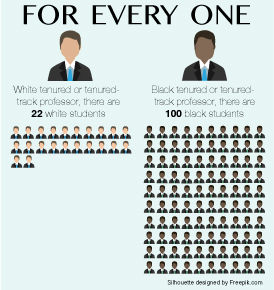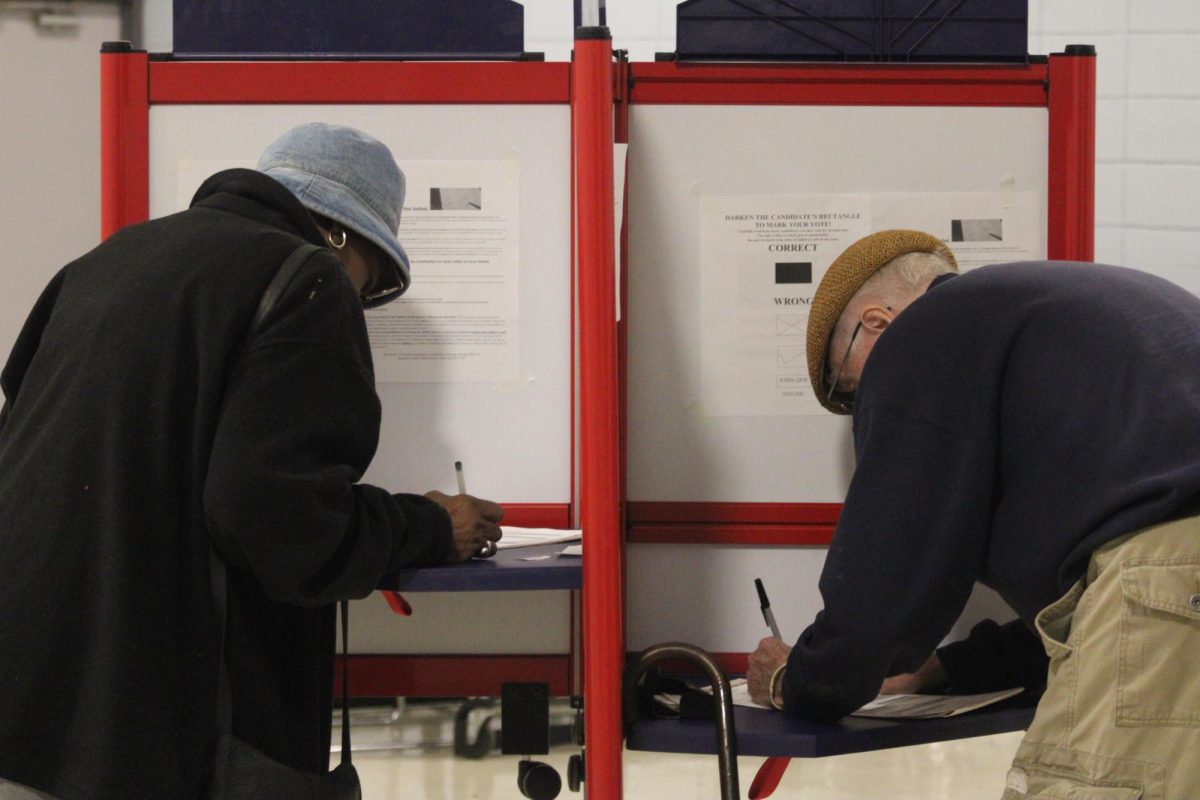Students to administration: Practice what you preach

December 2, 2015
SIU prides itself on its devotion to inclusivity, but some black students said the commitment to minority students ends once they pay tuition and step onto campus.
The university has one black tenured or tenure-track professor for every 100 black students — a ratio nearly five times less than white students to white tenured and tenure-track professors.
Johnathan Flowers, a doctoral candidate in philosophy from Oak Park, said a significant number of black professors would help minority students realize they can attain success in academia, a field considered to be the property of whiteness.
Advertisement
“One of the things having more minority faculty does is disrupt this predominant notion that the authorities in fields, particularly areas of scientific and intellectual development, are white,” said Flowers, who is also president of Graduate Assistants United. “If you put a person of color, or a woman, in front of a classroom, it generates the perception within the student that they, too, can attain that level of success.”
The University of Illinois’ ratio of black students to black tenured or tenure-track faculty is 22-to-1. The student body at U of I is 5 percent black, while SIU is 18 percent. However, the lack of a proportional increase in faculty of color reduces black SIU students’ likelihood they will have a teacher who shares in a similar life experience as a person of color in America, Flowers said.
Johanna Tesfaye, a senior from Champaign studying communication design, said she transferred from U of I because she heard SIU’s student body was more racially diverse.
“I transferred to SIU and I actually only had one African-American professor during my time here,” Tesfaye said.
Tesfaye said she only had a professor of color because she took a course in Africana Studies.
“The university should have more female and minority professors, if not just to offer a different perspective,” she said. “Professors, regardless of whether or not they try to be unbiased, come to a classroom with their own perspective. And, if most of the professors are white males, then that is the perspective the rest of the class kind of exists in.”
For every female tenured or tenure-track professor at SIU, there are 38 female students; for every male tenured or tenure-track professor there are 21 male students.
Many times professors act as mentors to some of their students, Flowers said. And in addition to being a benefit for the university, having a proportionate minority faculty to student ratio may also ease the discomfort and alienation many black, Hispanic, queer and transgender students feel.
Advertisement*
“I am willing to argue that any increase in retention of students of color is derived almost solely from the fact that these students feel comfortable talking about the kind of challenges they face and their life experiences — that are unique to their racial embodiment — with [their professor or mentor],” Flowers said. “Because there is this kind of implicit sense that this person understands what they are going through.”
Both Flowers and Tesfaye said the university should hire more professors of color, and fill administrative roles with people who have extensive experience working with less privileged and minority students.
“It definitely seems like the people who are in any sort of position of power, like tenured faculty, are white men,” Tesfaye said.
At SIU, there are 191 black students for every black person in an administrative role, and 300 Hispanic students for every Hispanic person in an administrative role. White men hold 48 percent of administrative, managerial and executive roles.
Cornelius Fair, a doctoral candidate in communication studies from Friars Point, Miss., said the administration needs to ask itself if it is doing everything in their power to combat discrimination on campus.
He said having a more balanced ratio of minority faculty to minority students would help create the opportunity for more transparent dialogues about diversity in and out of the classroom.
Associate Chancellor for Institutional Diversity Linda McCabe Smith, whose office oversees the university’s compliance with federal and state equity policies, said SIUC has several practices and policies focusing exclusively on hiring minority faculty, including women.
Smith said there is a diversity opportunity hire fund that allows the university to build a more diverse faculty. Additionally, the Underrepresented Tenure Track Faculty Program focuses on retention of minority faculty.
The university also has self-imposed goals to increase diversity among its workforce.
“In every department, the goal is to look at qualified minorities and females for hiring. We go beyond what is required from the state,” Smith said.
She said the lack of a state budget will likely affect diversification policies.
Flowers acknowledged the university’s budget crisis, but said those in charge need to hire professors of color at the same rate they bring in minority students. However, he said the university must be careful not to tokenize applicants, and not make hires just because of skin color.
“They should probably indicate ‘experience with students of color’ as a primary criteria when considering applicants,” Flowers said.
Fair said solutions to these problems are straightforward and recommended more opportunities for dialogue between administration and students, such as town hall meetings.
“Have these kind of open discussions where students can come and voice their opinions,” he said. “You have to get back to the basics — have town meetings and allow students to rally and protest.”
He said administrators must promote dialogue by responding directly, immediately and specifically to students’ qualms. Also, he said events like the State of the Student Address on Oct. 28 should occur at least monthly.
Smith said she is always open to direct dialogue with students. And while she couldn’t speak for the administration as a whole, she said she believes they are eager and able to have conversations with students about what can be done to improve student life.
Flowers said until systemic issues are addressed, he imagines potential applicants from underrepresented groups may not seriously consider SIU as an option.
“What SIU needs to do is turn around and have a serious conversation about institutional and systemic oppression and the kinds of discrimination within its administrative body,” he said. “And, it needs to have a serious conversation about whether or not the administration is offering appropriate levels of support for its minority faculty.”
Sam Beard can be reached at sbeard@dailyegyptian.com or on Twitter @SamBeard_DE.
Advertisement








